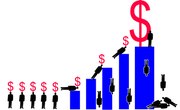Economics, the study of the production and transfer of wealth, is a science in and of itself. However, additional fields of science often influence how economics studies are carried out. Ranging from biology to physics, the field of economics is host to equations and theories that cut across many disciplines. These disciplines blend together to create a more accurate picture of how money and goods work in society.
Physics and economics
Physics and economics have developed such close ties that a whole new subfield has formed termed econophysics. Econophysics uses statistical modeling developed by physicists to analyze various aspects of finance, including market behavior and wealth distribution. By using such statistical models, economists are able to isolate and study specific factors within a market’s behavior, determining how important certain elements are to short- and long-term stability. Such equations may also help economists develop stronger risk-management techniques and tools, helping to keep financial institutions well informed of the changing dynamics of a complex market.
Biology and economics
Many theories from biology have also been applied to economics. Chief among these is natural selection, in which it is thought that evolution favors individuals who are best adapted to a situation. In economics, rational decision making is a similar model in which individuals seek choices that result in the most good. In both contexts, individuals best suited for an environment—be it an ecological or economical one—thrive. Also shared by biologists and economists is game theory, in which the many variables of a particular situation may be modeled. For biologists, evolutionary game theory helps determine what factors affect evolution. For economists, similar game theories help delineate which factors might affect market stability.
Chemistry and economics
Chemistry often affects economics on a practical level. In particular, green chemistry, the development of renewable or nontoxic materials and energy sources, drives changes in economics and commerce. The cost-benefit analysis of these new materials includes elements of both chemistry and economics. How much a particular material may affect the environment chemically is weighed against its monetary cost. In this way, the rise of tax incentives and grants for green chemistry research and development has fundamentally changed the way in which economics is carried out at both the state and federal levels.
Ecology and economics
Ecology is the study of how organisms and environments interact. Ecological economics, as the name suggests, is aimed at understanding the interaction between ecology and human economics. Specifically, this field relates to how economics and ecology have evolved together in a particular environment. Ecological economics may focus on questions of sustainability, but its primary concern is that of fair and efficient allocation of resources, for both humans and the environments they inhabit.
Related Articles
References
Writer Bio
An avid lover of science and health, Meg Michelle began writing professionally about science and fitness in 2007. She holds a bachelor’s degree in physics from Creighton University and master’s degree in science writing from Johns Hopkins. Her work has appeared in publications such as EARTH Magazine.











